It's month five of lockdown, and I'm playing two games that haven't really been a part of the cultural conversation for a few years: Middle-Earth: Shadow of War (2017) and Undertale (2015). I have great timing.


One of these games is a divisive but remarkable cult classic indie game. The other is a game that got some middling reviews and a few thinkpieces before being consigned to the annals of AAA action-RPG history. That said, the contrast between the two games and how they approach violence is remarkable.
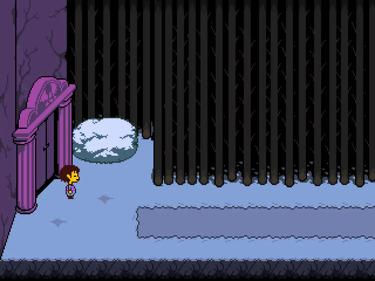
I'm not far into Undertale, but I'm already struck by the game's pacifist option. Undertale is a retro-looking top-down RPG where you play a little kid in a dream world populated by monsters. As is the case with a lot of JRPGs from the era Undertale is evoking, you'll get into random battles with weird-looking creatures and you'll fight them in a turn-based system. The twist is that you don't have to kill a single enemy you encounter. You always have the option to get to know them and then spare them. You don't get experience, but you get gold and the good feeling that comes with being nice to someone.
For example, in one of the early levels, you'll encounter a lot of dogs. The dogs will attack you, but you have the option to pet them and throw sticks for them. Once the dogs have warmed up to you, you can leave them alone.

It's a lovely system. It's certainly a simplistic view of conflict that depends heavily on little-kid logic, but it sure feels good to get out of bad situations by listening and being patient and observant. Obviously, this kind of pacifist system wouldn't work for every video game, especially stuff like Doom where the whole point is that your enemies are demons who will kill everything you've ever loved. But as much as I enjoy a cathartic violent game, I'm always in favor of a game that gives you the option to play through without killing anyone. It's something I've loved since I played Deus Ex, the game that made me rethink everything I thought I knew about video games. It's something I love about the Metal Gear series.
Undertale takes the pacifist option a step further by making the monsters you encounter kind of lovable. For the most part, if you just listen to them for a little bit, you'll find that they're lonely, or irritated about something, or in one particularly lovely encounter, trying to protect you. I'm too early in the game to find out what this is all building up to, but so far I'm having a nice time getting to know some weird monsters.
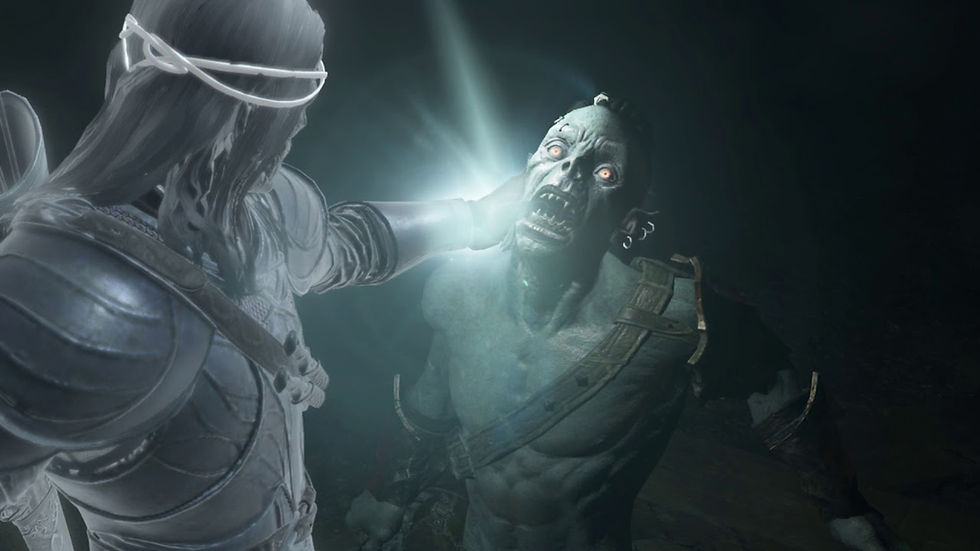
Then there's Middle-Earth: Shadow of War. It's certainly fun. It's a guilty pleasure. It's a Lord of the Rings game where you run around an open world terrorizing orcs. There are missions and a storyline, but really what I spend most of my time doing is seeking out orc captains and taking them down for experience points and gear.
Honestly, I've played plenty of violent games and open world games where you treat your enemies like mindless hordes and I don't feel particularly bad about it. But there's something particularly violent and cruel about Shadow of War that I can't fully shake and that leaves me feeling a little bit horrible when I play it. Now, I've tried to play Shadow of War before and had a similar feeling, but playing Undertale helps me articulate this feeling.
Shadow of War uses what's called the Nemesis system. If an orc kills you, it becomes a captain and joins the ranks of an elite caste of orcs, all of whom have names and personalities, like "Dush the Funny one" and "Ugbluk the Suspicious". These orcs move up the ranks through different confrontations with each other and by completing challenges that you may or may not be around to witness. They have bonds with each other as well as rivalries. You might be in the middle of fighting one of these orcs when their blood brother will come to their rescue.
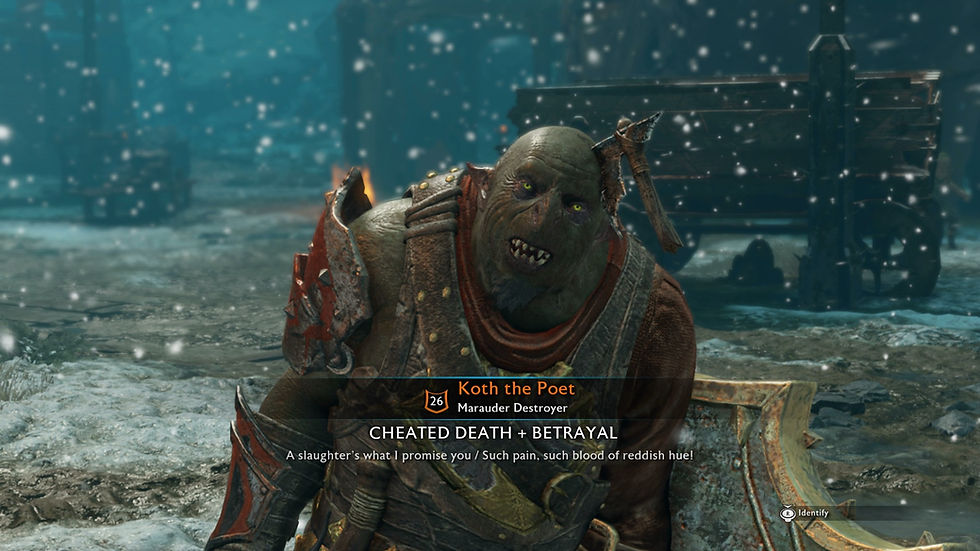
The thing is, much like with Undertale, learning about your enemies is a big part of gameplay. Finding out what their fears and weaknesses are and who they are working with helps you prioritize your targets. You can also use the orc relationships to get to the higher-ups: the warchiefs who command strategic resources for the orc army.
And then you murder them.
Okay, to be fair, you can also brainwash and enslave them.

The orcs in Shadow of War have far more personality than the boring, run-of-the-mill ranger hero or any of his boring human allies. They have interior lives and interests outside of killing. They may be violent and they may be wreaking havoc on the world outside of Mordor, but they're also far more well-rounded and fully developed characters than anybody they're attacking.
If Shadow of War was a little smarter, this would be a clever critique of The Lord of the Rings and how the noble Gondorians and Rohirrim don't really seem to have any interests other than a vague sense of justice and nobility. It would be flipping the conversation of Lord of the Rings on its head and be saying, "Hey, maybe humans and elves are also assholes." But Shadow of War doesn't really engage in this. With a baffling lack of self-awareness, Shadow of War gives character development to your enemies only to make killing them more entertaining. And I have to admit, much as it makes me feel kind of awful, it is fun to make your nemesis freak out because his biggest phobia is spiders and you've just summoned a bunch of spiders to his camp.
But man, does playing Undertale make this feel problematic. In both games, you're getting to

know your enemy, but in only one of those games does getting to know your enemy also mean that you empathize and seek alternatives to combat. Yes, the idea of taking a big, flashy action game like Shadow of War and adding a pacifist option sounds ridiculous, but I can't help but think about how much cooler the game would be if you could parley with some of these captains and get them to join your cause of their own free will, and all because you've gotten to know them really well. For example, Ugthal the Musician loves singing, right? Hey, why not get him to come to a tavern and see how great human music is? Get him drunk and onstage singing karaoke. Not only are you using what you've learned about him to get him to do something fun and unexpected, you're helping to develop his character's story! You are taking part in the story!
But that's what makes Undertale an RPG and Shadow of War an action game: you're not really supposed to change the story of Shadow of War. You don't have a choice but to kill or enslave these hapless orcs, no matter how much more interesting their stories are than yours. The game's central mechanic is to murder and subjugate your enemies, and if you do anything but that, you're playing the game wrong. It's the base, us-vs-them, human instinct that leads to real-life wars, and while it can be fun to exploit that instinct, in the end exploiting that instinct is artistic junk food: you don't really get anything from it but a gross feeling in your stomach.
That said, Undertale isn't exactly changing the world either. Its pacifist option is refreshing and fun, but it also means a lot of the conflicts boil down to very pat solutions bordering on cartoonish. And that's fine, because it's a cartoonish game that shares a lot of DNA with postmodern cartoons like Adventure Time (though I think Adventure Time has much more interesting things to say in its later seasons than Undertale). But conflict resolution isn't terribly complicated in Undertale and usually just requires you to click one option from the ACT menu and then the option to SPARE. It feels great, and I do like the message of "Hey, conflict is always resolved in games through arbitrary violence. What if it was resolved through arbitrary peace?" But it doesn't have much to say beyond that, at least not as far as I've seen. I'm certainly interested enough to keep playing and see if this idea goes anywhere interesting.
Okay, this brings me to one of my favorite games of all time: Nier: Automata.

Nier: Automata is certainly an action game. You do not have the choice to solve your problems pacifistically. The difference between Nier: Automata and Shadow of War is that Nier: Automata understands that this is a tragedy. Nier: Automata is one of the most tragic games ever created, where to live in the skin of one of its automaton protagonists is to be complicit in a system that requires you to deny the autonomy of others. Lots of games try to make the critique that "Hey, actually, you're a bad person for enjoying this violence," but Nier: Automata has maybe the smartest take on this. (I will say, Spec Ops: The Line is maybe the second smartest. It is also very good. I haven't played it in a long enough time to include it in this writeup, but I may have to revisit it soon.)

Nier: Automata puts you in the middle of a war between the human-designed, human-like androids of YoRHa and the alien robots who have taken over the Earth. (There are no humans left on Earth. The YoRHa take their orders remotely from a human moon base). The alien robots who have, at the start of the game, lived on earth for millenia are slowly learning sentient behaviors. They try to behave in ways that are human: they try to form relationships, they try to have sex, they try to have fun. None of these attempts at human behavior work, and the robots don't even seem to understand why they are trying to behave like humans, but they try anyway.
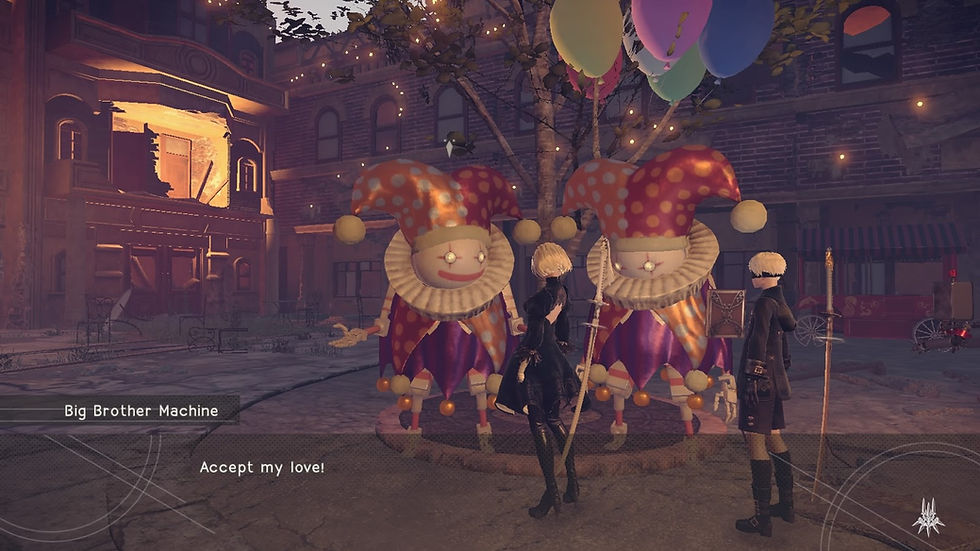
They are, in their attempts to fit into a pattern of normalcy for reasons that they don't seem to understand, some of the most relatable characters I have ever met in any piece of fiction.
You murder them by the thousands.
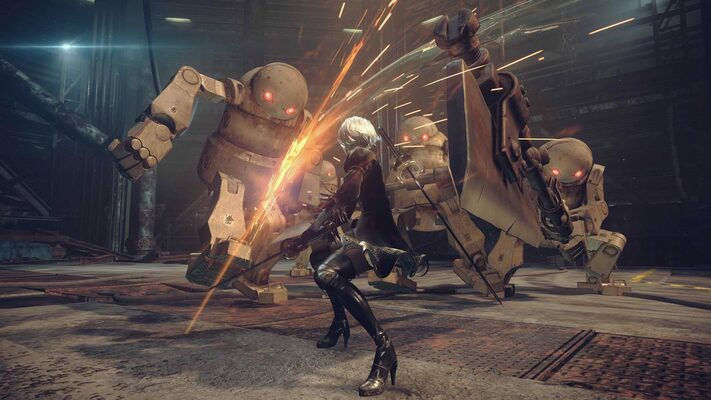
BUT! There's a big difference here. You are playing the YoRHa, who are also trying to fit into a pattern of normalcy for reasons that they don't seem to understand: the same patterns of normalcy that have lead human beings to war and conflict in endless cycles for all of history. And in the cases of the main characters, 2B and 9S, this is a tragedy. 2B, in particular, hits a breaking point in an incredible scene where she laments the endless cycle to which she feels condemned. (I won't give away more than that; just know that this is the first of several of the game's main "endings" and that it broke my heart.)
So yes, you're playing the game and the game is telling you that playing it is bad. This is the sort of self-defeating moralizing that a lot of games do unsuccessfully. But Nier: Automata has a point to make: this conflict is inevitable. Human beings are drawn to patterns of conflict and war and they don't understand why any more than the genital-less little bucket robots understand why they are drawn to sex. And the game understands that this is tragic. This makes the game far deeper than Shadow of War with its message of "Hey, your enemies may have fully fleshed-out lives and personalities, but they're ugly monsters so we have to kill them." It's also far deeper than Undertale, with its sweet but perhaps too idealistic message of "You know, if we just talked about our problems more, we probably will never have to fight ever again."
Nier: Automata is a depressing game, but everyone should play it if only to see just how intelligent and thought-provoking games can be. It's a meditation on how much unfulfilled potential human beings have as a species and a treatise on the hard-wired flaws that keep us from our full potential. It's a violent video game where the violence is saying something. The fact that there's no pacifist option in Nier: Automata isn't a flaw; it's a statement.
Comments